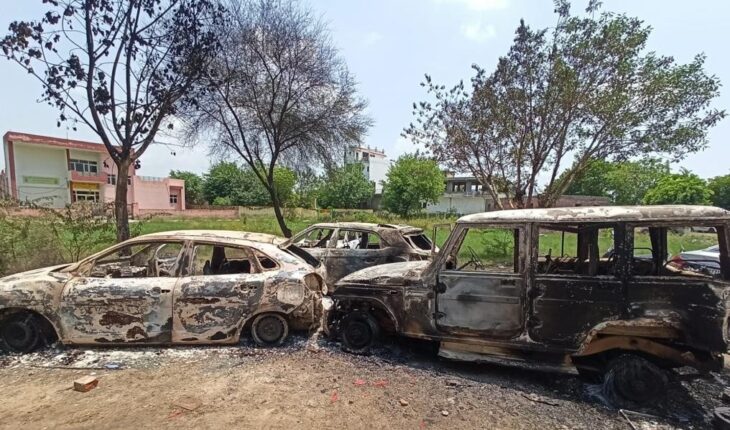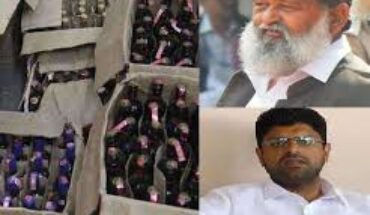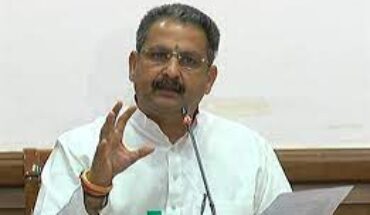Nuh/Mewat :A deadly calm prevailed in Nuh-Mewat after Wednesday’s clashes that killed six people, including two home guards, and injured more than 90. The angry mob set fire to more than 100 vehicles and left burned vehicles on the highways. The roads were apparently controlled by anti-social groups for more than six hours, leaving the population and communists at the mercy of the rioters.
The violent mob spared no place; even the cyber police station in Nuh was targeted for destruction. Hospitals, grocery stores and liquor stores also fell victim to vandalism.
Residents were frightened and hesitant to speak, not wanting to share their pain and seeking only harmony. The streets were littered with destroyed remains of burnt vehicles, bricks and scorched tires – a silent testimony to the violence and bloodshed that continued for many hours without the administration taking any action.
One concerned resident said that the population was having trouble getting ration items from the store: “There is an atmosphere of fear. We do not send our children outside. Even at night we are very afraid and do not know what will happen”
A local fruit vendor, on the other hand, complained that his income has been affected because customers no longer come to his kiosk to shop. “I sell vegetables, but in the last two to three days sales have decreased…if customers don’t come, how will we make a living? Since no one comes, the vegetables are spoiled. We are very worried,” he said.
Emissary paramilitary forces armed with batons and rifles marched throughout the Nuh and Sohna area. They beat anyone who left their homes during curfew. “Curfew hai, bhagandar,” they shouted as they swung their batons at those who ventured out.
When asked repeatedly, a senior citizen who was concerned about the future of the misguided youth of Mewat replied, “We are so disappointed with the media coverage, especially the way you have portrayed Nuh-Mewat as a notorious area. How can the entire district be a hotbed of terror? The people here are innocent and peace-loving. How can you treat the entire community and district as terrorists? At least the media should play a positive role now, as they have done in many cases. Why is Nuh being blamed for all the crimes in the whole country?”
“Point out with pride that despite the Hindu-Muslim divide, Mewat has hardly any rioting on the index,” he said. “Even now, when the situation is so tense, there have been no riots,” says Samshad, who insists on looking at the situation objectively. That’s largely thanks to the police, who have done everything they can to catch the culprits. “Social media is a big problem, especially the fake accounts that contain few facts and a lot of emotion and are all too willing to use their power to inflame tempers,” says a police official.
“It’s a tense time for these people. The entire national media is here asking them uncomfortable questions they do not have answers to. These questions should have been asked much earlier – not by the media, but by the authorities and the politicians – and then maybe this day would not have befallen this Muslim zone,” said an official who asked not to be named.
Ironically, Nuh-Mewat itself is low on the crime index because, unlike major cities where extortion, kidnapping and other heinous crimes dot the landscape, only minor looting and hostile killings are recorded here. Nevertheless, “The area is known for its gunmen, who are regularly used in gang killings, and nearly 100 gangs are active in the areas bordering the district. Thirty of them are large gangs that make their living exclusively from criminal activities,” said a police official.
“In the past, they were only involved in minor crimes such as cattle or bicycle theft. Now, however, they have become more structured, not only robbing trucks but also demanding ransom from families after kidnapping drivers. Interestingly, youth with secondary education are defrauding people in neighboring states through Internet fraud,” said a police official who wished to remain anonymous.
Socioeconomic factor
Mewat covers three legislative assembly areas – Nuh, FirozpurJhirka and Punhana, which lie on the Delhi-Alwar road. About 75% of the population is Muslim, most of whom are farmers. According to local residents, Mewat is now a classic example of government neglect.
A recent government survey found that Mewat, with a population of 10,000, is the most underdeveloped district in Haryana. The district lags significantly behind other districts in Haryana in terms of living standards, education and health care.
Boasting a literacy rate of just 56.1 percent, Mewat holds the unfortunate title of being the district with the lowest literacy rate. Out of the 162,000 students enrolled in primary schools, only 48,000 managed to reach 8th grade, and merely 12,000 students passed the 10th grade last year.
“There are no proper schools in the Mewat, teachers don’t wish to join the Mewat schools. It was said earlier that there are around 3000 teachers in the district,” said a local. He further added that even health services are no better, almost 44,000 deliveries take place every year, and has few doctors around in the area.
Farmers in this region rely solely on rainfall for their water supply, thus, they can only yield one crop per year. To exacerbate matters, the groundwater in this area is salty, and there are no canal systems. Only a small number of farmers have access to tube-wells for irrigation.
In absence of livelihood avenues, youth often indulge in petty crimes such as auto lifting. There are incidents of looting trucks and extorting money.
“Due to poverty and lack of employment avenues, people of Mewat are inclined towards crime” said Naeem Ahmed, a local activist. However, “a industrial unit has also been set up, but that did not fetch results either.” Not many industries want to come because of the negative perception about the Mewat, he added.
Several governments that ruled the Haryana have almost neglected the region, is the common grudge among the people of mewat. “Other districts of this belt have been developed but have been neglected by both the Congress and BJP. The entire Mewat is craving for development, or else these young people here will be misguided,” said a 65 year old, ChoudharySafeeqali.
Ali further explained that due to the perceived intentional suppression of the ‘Mewati-Muslims’ by the government, as the local population is often referred to, coupled with a campaign conducted by orthodox international Islamic preachers under the banner of TablighiJamaat, there’s a concern that the region’s liberal Muslims may be influenced by individuals with ulterior motives. This is a claim made by several observers.
The tangible fear of being falsely implicated in terrorism cases amplifies the feeling of estrangement among the youth who are yet to be exposed to terrorist ideologies. This is ostensibly due to the lack of access to internet and television, which would otherwise provide them a broader understanding, he added.
Ali retorted that Mewat is undeservedly being stigmatised by those with hidden agendas as a place that breeds terrorists. We have stood firm against the Mughals, the British, and every other entity that has attempted to dominate us. If this doesn’t affirm our deep affection and commitment to our land, what will?




